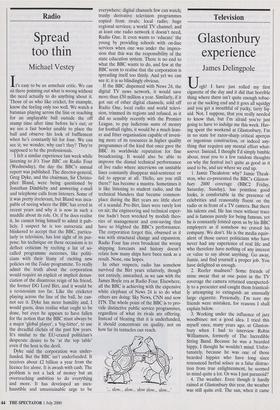Radio
Spread too thin
Michael Vestey
It's easy to be an armchair critic. We can sit there pointing out what is wrong without the need actually to do anything about it. Those of us who like cricket, for example, know the feeling only too well. We watch a batsman playing across the line or reaching for an unplayable ball outside the off stump time after time before he's out; or we see a fast bowler unable to place the ball and observe his look of bafflement when he's constantly hit for four. We can see it; we wonder, why can't they? They're supposed to be the professionals.
I felt a similar experience last week while listening to It's Your BBC on Radio Four (Wednesday), the day the BBC's annual report was published. The director-general, Greg Dyke, and the chairman, Sir Christo- pher Bland, were being questioned by Jonathan Dimbleby and answering e-mail and telephone calls from listeners. Some of it was pretty irrelevant, but Bland was inca- pable of seeing where the BBC has erred in recent years and why it is now in such a muddle about its role. Or, if he does realise it, he cannot bring himself to admit it pub- licly. I suspect he is too autocratic and blinkered to accept that the BBC, particu- larly in television, has lost sight of its pur- pose; his technique on these occasions is to deflect criticism by reciting a list of so- called programme successes, like politi- cians with their litany of exciting new policies on the Today programme. To really admit the truth about the corporation would require an explicit or implicit denun- ciation of the disastrous reign of his friend, the former DG Lord Birt, and it would be a revisionism too far. Like the cricketer playing across the line of the ball, he can- not see it. Dyke has more humility and, I would guess, does realise what ought to be done, but even he appears to have fallen for the notion that the BBC must always be a major 'global player', a 'big-hitter', to use the dreadful clichés of the past few years. It's similar to the EU-crazed politician's desperate desire to be 'at the top table' even if the host is the devil.
Dyke said the corporation was under- funded. But the BBC isn't underfunded. It receives about £2 billion a year from the licence fee alone. It is awash with cash. The problem is not a lack of money but an overreaching ambition to do everything and more. It has developed an inex- haustible and unsustainable urge to be everywhere: digital channels few can watch; trashy derivative television programmes copied from rivals; local radio; huge regional services; a world TV channel; and at least one radio network it doesn't need, Radio One. It even wants to 'educate' the young by providing schools with on-line services when one was under the impres- sion that this was the responsibility of the state education system. There is no end to what the BBC wants to do, and few at the BBC seem to realise that the corporation is spreading itself too thinly. And yet we can see it; it is so blindingly obvious.
If the BBC dispensed with News 24, the digital TV news network, it would save more than £50 million a year. Similarly, if it got out of other digital channels, sold off Radio One, local radio and world televi- sion, trimmed its regions and refused, as it did so sensibly recently with the Premier League, to pay ludicrous sums of money for football rights, it would be a much lean- er and fitter organisation capable of invest- ing more of its resources in higher quality programmes of the kind that once gave the BBC its worldwide reputation for fine broadcasting. It would also be able to improve the dismal technical performance of live radio where interviews on unstable lines constantly disappear mid-sentence or fail to appear at all. 'Hello, are you still there?' has become a mantra. Sometimes it is like listening to student radio, and the technical blunders that became common- place during the Birt years are little short of a scandal. Pre-Birt, lines were rarely lost on air; the engineering and technical exper- tise hadn't been wrecked by modish theo- ries of management and cost-saving that have so blighted the BBC's performance. The corporation forgot this, obsessed as it was with structural change and expansion. Radio Four has even broadcast the wrong shipping forecasts and history doesn't relate how many ships have been sunk as a result. None, one hopes.
In other respects, radio has somehow survived the Birt years relatively, though not entirely, unscathed, as we saw with the James Boyle era at Radio Four. Elsewhere, all the BBC is achieving with the expensive white elephant of News 24 is to do what others are doing: Sky News, CNN and now ITN. The whole point of the BBC is to pro- vide distinctive public service programmes, regardless of what its rivals are offering. Instead of bleating that it is underfunded, it should concentrate on quality, not on how far its tentacles can reach.
slow... slow... slow slow... slow...'


























































 Previous page
Previous page